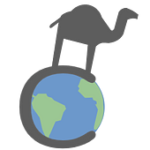A Zero-Waste Grocer at the Edge of Patagonia
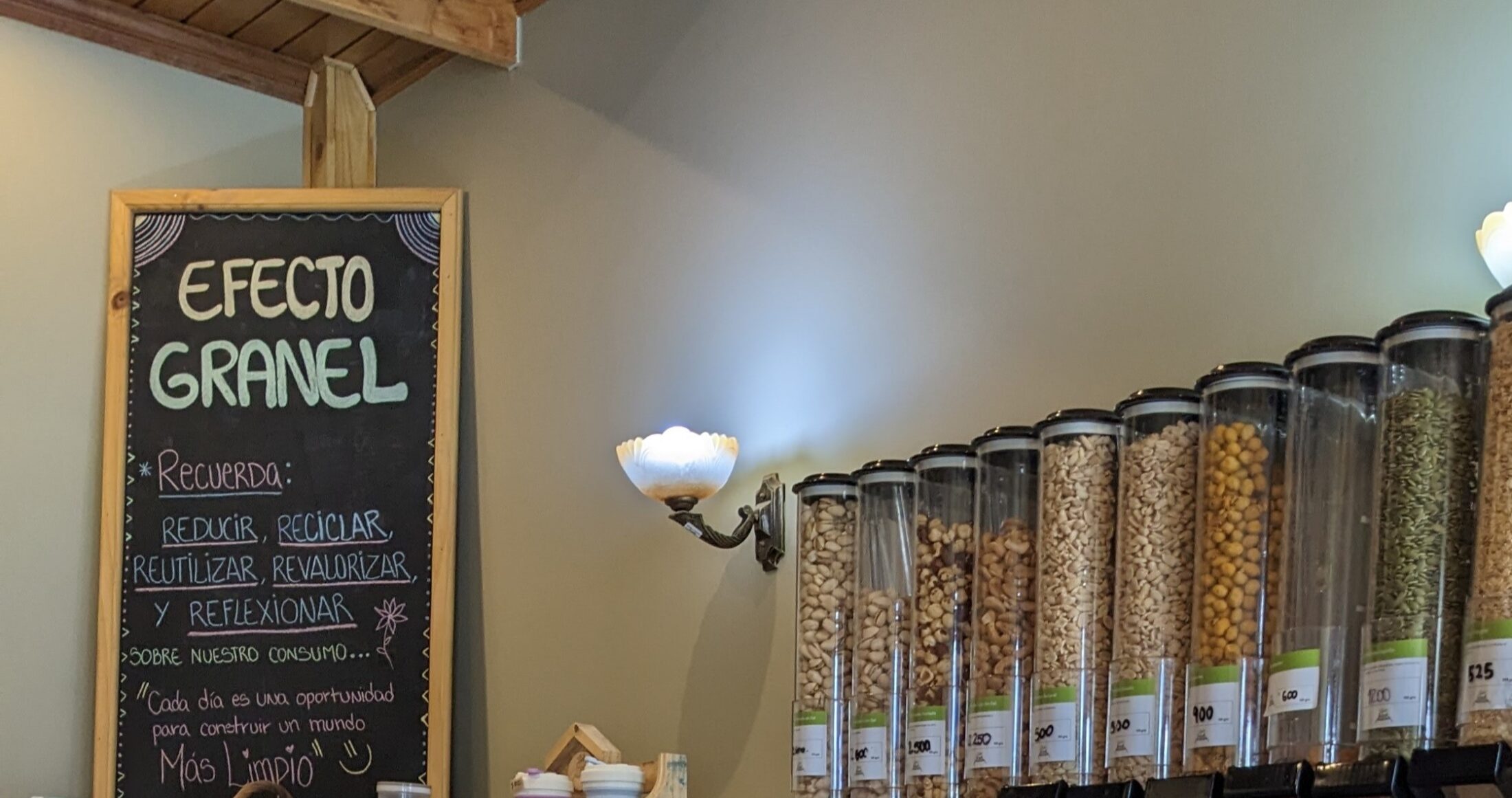
We didn’t know what to expect from Puerto Natales, a Southern Chilean town of less than 20,000, not including all the tourists who come in the summer to hit up Torres del Paine National Park just to the north. Our first day here, we stumbled upon Efecto Granel, a recently-opened zero-waste bulk food store. I’m a journalist, and also someone who is deeply pained by the amount of plastic packaging and waste produced from the simple human need to buy and eat food. So I couldn’t pass up an opportunity to interview the owner of Efecto Granel, Paula Brevis.
Paula was born and raised in Puerto Natales. She is a single mom to a young daughter and a resourceful, creative entrepreneur. She saw a need for a zero-waste grocery option and decided to be part of the solution. I loved browsing her store, from the selection of local products to the huge detergent and olive oil refill containers, to the customer-provided glass jars available to fill with bulk goods. Enjoy this edited English translation of our conversation, plus a few video highlights.
Launching the Store
How did you have the idea for Efecto Granel?
The idea came out of a personal need. Even today, there are not good alternatives for buying food and cleaning products without generating waste. It is a tremendous problem on the world, national, and local level. Here in Natales, we have problems with trash. You try in the house to collect recycling, but the best way is to reduce waste is to not generate waste. This is where the idea came from.
The best way is to reduce waste is to not generate waste.
– Paula Brevis
Are there already things like this in Puerto Natales?
There are, but few. We are a few bulk foods stores. Even fewer that have a clear focus on reducing waste. Here, we make a huge effort to use paper bags instead of plastic ones. The idea is that everything has a consequence. If you use paper, it still generates waste, but it has less environmental impact.
In the U.S. there are many rules around containers and food. I don’t know if they’d just allow people to drop off cleaned glass jars to reuse in a bulk food store like this. What is the situation here?
It depends on the item. I used to sell bulk pet food. It also comes in plastic and that plastic is very difficult to manage. So I would buy it in bulk so that people didn’t have to buy the small bags of pet food. SAC [Servicio Agrícola y Ganadero, Chile´s government ministry that regulates agricultural products] had many rules, logistics, and permitting hoops to jump through, and it wasn’t worth it.
I’m here on my own managing the store. I have opted for alternatives that are the most manageable. Buying in bulk is not so common in Chile, so there are not that many rules around it. So far, it hasn’t ben a problem. I’ve heard that there are rules around selling oil in bulk, but no one has come around here. There comes a point where you decide, well, I’ll run that risk.
How is the business going? And what was it like to get it started?
The process was up and down. We started at the height of the pandemic. But we had the benefit of staying open since we sold food products, whereas other stores had to shut down. But it is a new format. Natales is a small town, and it is a challenge to show that through this we are doing something good for our environment that we all share.
It’s an issue of changing people’s mentalities. It isn’t anything massive, yet there are more and more people changing. There are people who come here just for sweet things. But others who come with their containers and jars, knowing that it is important. So we’re holding steady. It is difficult running a business in this time of economic complications. We have some prices that are competitive and some that aren’t. The big stores can buy larger quantities for less. So it is difficult to be competitive. But we do have people who prefer us because they know it is important.
The Nuts (and Fruits) and Bolts
What are the most popular products?
Most popular are the dried fruits and the cleaning products. We work with FreeMet, a national brand free of metals, for cleaning products. Their products are concentrated, so they yield a lot of use and they clean very well.
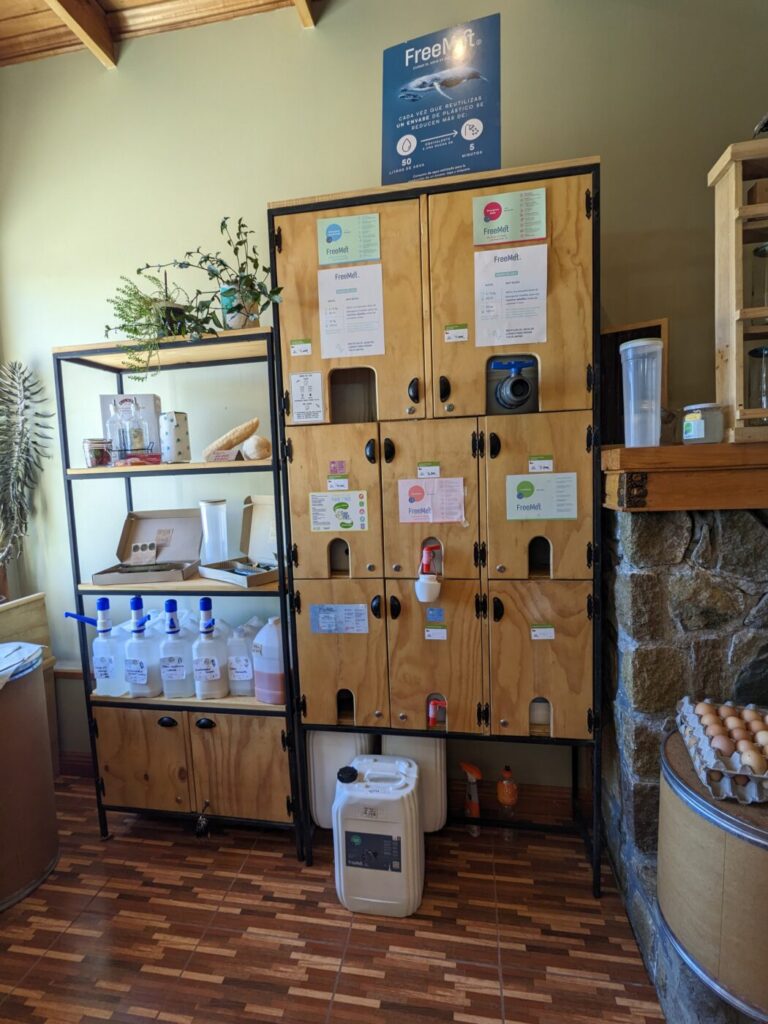
Do tourists come to get their things for treks?
Yes, more and more people are coming by word of mouth. Yesterday a boy came who said, “Hey your store is really nice, beautiful, but it’s very hidden.” So we are working on publicity. It is a process. It’s not just selling things. There is a very clear mission, which motivates us more.
[Note: Efecto Granel has changed locations since I interviewed Paula, and is now located at Andres Bello 498.]
It seems like there are many aspects of this project. It’s not just about food but also about education and creating community.
I was born here. It’s painful for me to see trash in the streets flying around. If you go some sections near the coast that aren’t as visible, they are full of trash. Sometimes birds eat these items and they die.
– Paula Brevis
Other times they wash into the sea. It’s sad. Especially in a place so beautiful.
Creating community is important. There are many other environmental projects in Natales and we are trying to find ways to work together and empower environmental education in the community. We teaching people to prefer local businesses and products, projects that don’t generate waste, and support recycling programs. It is very difficult for recycling to catch on here, because it’s hard. Here, people don’t understand. “Why do I have to pay for them to take away my waste?” It’s easier just to throw things in a bag and forget about it.
I was born here. It’s painful for me to see trash in the streets flying around. If you go some sections near the coast that aren’t as visible, they are full of trash. Sometimes birds eat these items and they die. Other times they wash into the sea. It’s sad. Especially in a place so beautiful.
How did you arrive at an environmental consciousness?
It is the work of ants, going little by little. People often don’t understand or have interest, but some say, “Oh yes, you’re right. I’m going to join you.”
I feel that we are on the right path, but there are other problems that the community has been occupied with—the pandemic’s effects, the economic crisis. We are in difficult times. So our minds are more on that than on some things that we’ve put to the side but shouldn’t be sidelined.
But all these crises are connected.
Yes, it’s important to familiarize ourselves with the idea of a circular economy. If businesses can avoid generating waste, then we don’t have to put resources into managing that waste, and can use them for other problems. And the simple fact is that the earth is suffering a lot, and there is a latent danger that we don’t see. We are only focused on what’s in front of us. How many species are becoming extinct because of climate change? This has to do with our waste management. Humans are killing the earth, our home, and obviously, the laws, the economy, everything is connected. So we’re in vicious cycle.
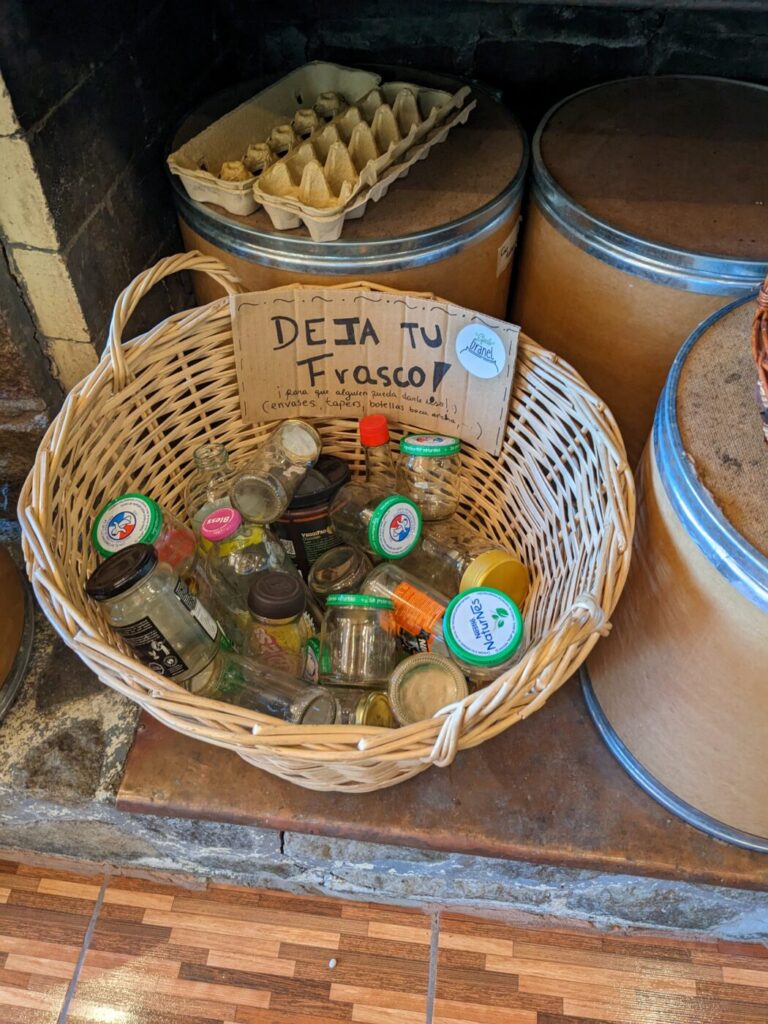
What was the switch for you from indifference to active care?
I have always had an affection for nature. I was part of a scouts group. Having lived in other places and gotten to know other parts of the world, I have arrived at a more reflective perspective around this theme.
But on a more powerful level, a few years ago, I just felt a growing frustration. But we can’t do things out of desperation, we have to proceed calmly. It’s impossible to make everyone in the world get it right away. But I think more and more people are becoming conscious.
It was something gradual for me. Not throwing trash in the streets, for example. But I still consumed many things and generated lots of waste, because that was normal. But it’s about using the knowledge that’s already available. You follow social media accounts that give you ideas for how to reduce waste, so you start moving in that direction, making changes.
Practical Tips for Starting a Zero Waste Food Store
What suggestions would you offer to anyone thinking about starting a zero waste grocery store?
Think about what products you can start with that will sustain your business best. Then little by little you can start incorporating more and more of what people ask for. I can’t offer some items, because they are very costly.
Everything depends on your location. Hopefully you can find a location with a lot of traffic.
In the beginning a lot of people came because we were something new in Natales, but now I think if I were in a place where there was more traffic, there would be more movement of goods in the store. There are many things to consider. Also, hopefully you could work in a group with someone. It would allow you to divide the tasks.
I’ve seen the co-op model work in some places in the U.S., for bulk food purchase.
The challenge is to complete all the tasks necessary for the project to be successful. With more heads involved, there are more hands, but also it takes more time to make decisions. Time is the most valuable. I think it would be much more bearable [in a co-op]. But, time. I don’t want the process to be painful for me. So I do things calmly, I have to focus on my daughter. I have a human daughter in addition to this child here [the store]. I have to find balance.
I haven’t closed myself off to the possibility of a partner, but it’s like getting married to do a business with someone. Therefore you have to be sure of the person, make sure it’s sustainable, understand each other well.
The other super-important thing, when one starts, is to find good suppliers. One thing that makes us stand out is the quality of our products. I don’t always look for the cheapest supplier. It has happened to me that I can’t find a product in one place so I go to another, and find it’s cheaper. But then the quality is very different—the flavor, the appearance, everything. If you want to nourish yourself well, you need good, fresh products.
So I would focus on this finding good suppliers. And being able to find various products through one supplier.
How many suppliers do you work with?
About 15.
All are in Santiago?
Yes, I work with a transport company that moves things from Santiago to Natales. This company has good prices, and it’s simpler for me to have one company bring everything.
On some occasions I’ve bought things from smaller local suppliers, but it’s more difficult because you have to buy a large quantity of one product to make it convenient, and the logistics are more complicated. You have to invest more in one product, create space to store this one product. So it’s a series of actions. So for now, I decided to simplify and buy everything from these few producers in Santiago.
I have two small storehouses in the back “First in, first out” (FIFO) is the motto. There hasn’t been too much of a problem with this. I’ve had to throw some things out in the past and it’s really painful but it’s a learning process. Then I have to learn that some things run out fast, so I have to think about how much in advance I should order a product because I don’t want to end up with an empty container. And sometimes I don’t know when they will arrive. Sometimes there might be problems at the border with Argentina. Sometimes there are strikes in Santiago. Sometimes there’s bad weather.
The other thing that’s important is promoting local products. I have many local products from small entrepreneurs. They don’t have the capacity to sell things in a set location, because they produce very little, so I can help promote these local makers. Then you can say, “Don’t go to the pharmacy, come buy things that are made here.”
Also, being responsible with the time. Keep fixed hours so people know you will be here, instead of closing whenever you want.
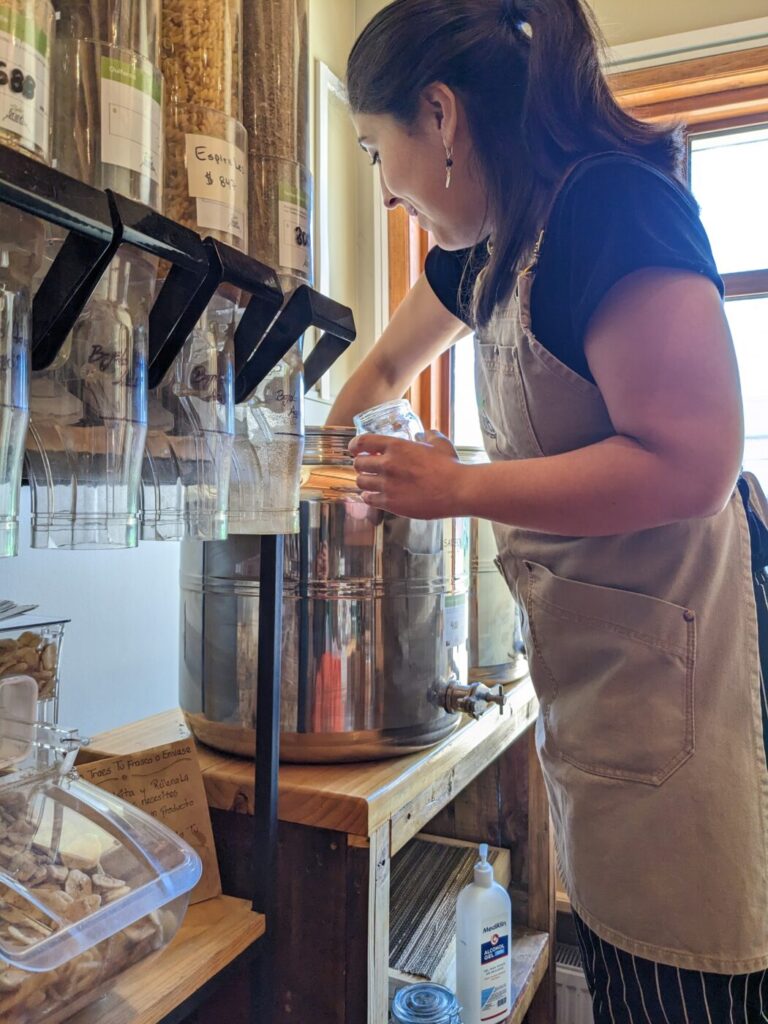
A Generational Task
It must be interesting for your daughter to be on this adventure with you.
Yes, it’s raising her environmental consciousness. I think each generation has a clearer vision of the world. Thinking of myself at my daughter’s age, I wasn’t aware of nearly as much. She speaks as if she is an adult. That is why education is very important, from kindergarten to university. It’s a problem generationally—older people aren’t going to change as much. Now, in many cases, children are teaching their parents and grandparents about environmental topics.
It sounds exaggerated, but the future of humanity depends on this. There is much evidence. We have to act. And also with humility. I can learn from a small human, just as she can learn from me.



